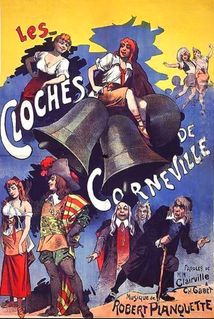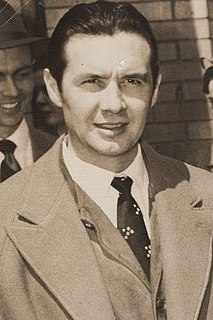Opera buffa is a genre of opera. It was first used as an informal description of Italian comic operas variously classified by their authors as commedia in musica, commedia per musica, dramma bernesco, dramma comico, divertimento giocoso.

Count Alessandro di Cagliostro was the alias of the occultist Giuseppe Balsamo.

The Kingdom of God Is Within You is a non-fiction book written by Leo Tolstoy. A Christian anarchist philosophical treatise, the book was first published in Germany in 1894 after being banned in his home country of Russia. It is the culmination of 30 years of Tolstoy's thinking, and lays out a new organization for society based on an interpretation of Christianity focusing on universal love.

Comic opera is a sung dramatic work of a light or comic nature, usually with a happy ending and often including spoken dialogue.
In music, an intermezzo, in the most general sense, is a composition which fits between other musical or dramatic entities, such as acts of a play or movements of a larger musical work. In music history, the term has had several different usages, which fit into two general categories: the opera intermezzo and the instrumental intermezzo.
Cagliostro-Walzer op.370 is a waltz by Johann Strauss II composed in 1875 based on themes from his operetta, Cagliostro in Wien which premiered on 27 February 1875 at the famous Theater an der Wien.

Aleksey Nikolayevich Tolstoy, nicknamed the Comrade Count, was a Russian writer who wrote in many genres but specialized in science fiction and historical novels.

The Death of Ivan Ilyich, first published in 1886, is a novella by Leo Tolstoy, considered one of the masterpieces of his late fiction, written shortly after his religious conversion of the late 1870s.

Mikael Leonovich Tariverdiev was a prominent Soviet composer of Armenian descent. He headed the Composers' Guild of the Soviet Cinematographers' Union from its inception and is most famous for his movie scores, primarily the score to Seventeen Moments of Spring.

Cesare Siepi was an Italian opera singer, generally considered to have been one of the finest basses of the post-war period. His voice was characterised by a deep, warm timbre, a full, resonant, wide-ranging lower register with relaxed vibrato, and a ringing, vibrant upper register. Although renowned as a Verdian bass, his tall, striking presence and the elegance of phrasing made him a natural for the role of Don Giovanni. He can be seen in that role on Paul Czinner's 1954 film of the opera made during an edition of the Salzburg Festival under the baton of Wilhelm Furtwängler.
Stepan Ivanovich Davydov was an Imperial Russian composer and singer. He was born in Chernihiv in the Russian Empire.

Der Graf von Luxemburg is an operetta in three acts by Franz Lehár to a German libretto by Alfred Willner, Robert Bodanzky, and Leo Stein. A Viennese take on bohemian life in Paris at the beginning of the 20th century, the story revolves around an impoverished aristocrat and a glamorous opera singer who have entered into a sham marriage without ever seeing each other and later fall in love at first sight, unaware that they are already husband and wife.

Aleksandr Leonidovich Vishnevsky was a Russian actor and one of the founding members of the Moscow Art Theatre.

Scipio Colombo was an Italian dramatic baritone, and was known for his abilities as a musician and singing-actor.

Cagliostro in Wien is an operetta in three acts by Johann Strauss II to a libretto by F. Zell and Richard Genée. It premiered on 27 February 1875 at the Theater an der Wien, featuring Marie Geistinger and Alexander Girardi.

Count Lev Nikolayevich Tolstoy, usually referred to in English as Leo Tolstoy, was a Russian writer who is regarded as one of the greatest authors of all time. He received nominations for the Nobel Prize in Literature every year from 1902 to 1906 and for the Nobel Peace Prize in 1901, 1902, and 1909. That he never won is a major controversy.

Le congrès des rois was a 3-act French Revolutionary opera of the genre comédie mêlée d'ariettes with a libretto by De Maillot, a stage name used by Antoine-François Ève early in his career, and music by a collaborative of twelve composers. It was a satire directed against the "enemies of France". The libretto and most of the music has been lost. The composition of the opera was ordered by the Comité du Salut public to be completed in two days. The opera was first performed on 26 February 1794 [8 vent II] by the Opéra-Comique in the first Salle Favart and was presented a total of 2 times. At the premiere, "the length of the work and its couplets' lack of charm tired the audience, which took out its bad feelings on the ballet. Sharp whistles grew louder still, and the authors were not acknowledged." When the second performance met a similar reception, the management ended its run.
Comédie-ballet is a genre of French drama which mixes a spoken play with interludes containing music and dance.
Victor Charles Paul Dourlen was a French composer and music teacher at the Conservatoire de Paris during the first half of the nineteenth century. He is primarily known as a theorist on account of his treatises on harmony, based on the methods of Charles Simon Catel, which were widely used as reference works, especially his Traité d'harmonie, the Traité d'accompagnement pratique, and his Méthode élémentaire pour le pianoforte.
"Walk in the Light While There is Light" is a short story by Leo Tolstoy written in 1893. According to famed Tolstoy-translators Louise Maude and Aylmer Maude, this story reflects Tolstoy's interest with early Christians, and according to translator Huntington Smith, this is a story about the early times of Christianity.












